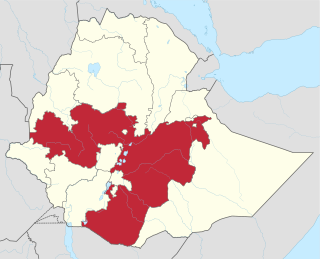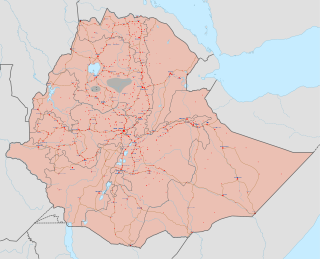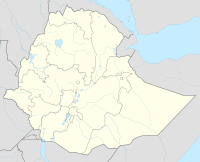
The politics of Ethiopia are the activities associated with the governance of Ethiopia. The government is structured as a federal parliamentary republic with both a President and Prime Minister. The legislature is multicameral, with a house of representatives and a council. The term politics of Ethiopia mainly relates to the political activities in Ethiopia after the late 20th century when democratization took place in the nation. The current political structure of Ethiopia was formed after the Tigrayan People's Liberation Front (TPLF) overthrew dictator President Mengistu Haile Mariam in 1991. A general election was held in June 1994 and Ethiopia has maintained a multiparty political environment until today.

General elections were held in Ethiopia on 15 May 2005, for seats in the House of Peoples' Representatives and four regional government councils. Under pressure from the international community, Prime Minister Meles Zenawi promised that this election would be proof that more democracy would come in this multi-ethnic nation; international elections observers from the European Union (EU) and the U.S.-based Carter Center were present to observe the results. This election succeeded in attracting about 90% of the registered voters to the polls. A government ban on protests was imposed throughout the election period.

The Coalition for Unity and Democracy, commonly referred to by its English abbreviation CUD, or occasionally CDU, was a coalition of four existing political parties of Ethiopia which combined to compete for seats in the Ethiopian General Elections held on May 15, 2005, and around the end of that year, became a full-fledged political party. Its leader was Hailu Shawul and the political party was dissolved in 2007.
Hailu Shawul was an Ethiopian politician and civil engineer who was the leader of the Coalition for Unity and Democracy (CUD) during the 2005 Ethiopian general election. He was also the leader of All Ethiopian Unity Party from 1996 to 2013. He died on 6 October 2016, while receiving treatment at a hospital in Bangkok, Thailand.
Beyene Petros is an Ethiopian politician and educator who was the professor of Biology at Addis Ababa University and a former member of the Ethiopian House of People's Representatives, representing an electoral district in Badawacho of Hadiya Zone. He is currently the chairman of one of the largest opposition political parties in Ethiopia, the Ethiopian Federal Democratic Forum Medrek.

According to the U.S. Department of State's human rights report for 2022, there exists "significant human rights issues" in Ethiopia. In addition to extrajudicial killings and instances of "enforced disappearance", other human right issues in Ethiopia include arbitrary arrest, the censorship and unjustified arrests of journalists, the use of child soldiers, and more.
Lidetu Ayalew is an Ethiopian politician who is the founder and the leader of the Ethiopian Democratic Party. He was a deputy chairman and chief spokesperson of Coalition for Unity and Democracy (CUD), during the 2005 Ethiopian general election.

The Unity for Democracy and Justice was an Ethiopian political party. It was founded by Birtukan Midekssa on 20 June 2008, based on the parties that constituted the Coalition for Unity and Democracy. It was a major component in the eight-party Medrek coalition, the largest opposition coalition in the 2010 election. In May 2019, the party merged with the Ethiopian Citizens for Social Justice, bringing an end to the party.

The Ethiopian Democratic Party is a political party in Ethiopia. The result of no less than five mergers of liberal and conservative liberal opposition parties, it could trace its roots to the Ethiopian Democratic Union, which mounted armed monarchist resistance to the Derg in the immediate aftermath of the overthrow of Haile Selassie I. In the legislative elections held on 15 May 2005, the United Ethiopian Democratic Party – Medhin, as it was then known, was part of the United Ethiopian Democratic Forces, that won 52 out of 527 seats in the Council of People's Representatives. It won no seats in the 2010 elections.
Andargachew Tsege, also known as Andy Tsige or Andy Tsege, is an Ethiopian politician. He is the chief executive officer of ESAT, a nonprofit independent media outlet in Ethiopia. He previously served as the secretary-general of Ginbot 7, a political party that was labeled as a terrorist group by the Ethiopian government until 2018. On 23 June 2014, he was abducted by Ethiopian security forces while in transit in Yemen's Sana'a International Airport and held at an unknown location in Ethiopia. On 29 May 2018, he was freed by the Ethiopian government following political reform by Prime Minister Abiy Ahmed.

The 2014–2016 Oromo protests were a series of protests and resistance first sparked on 25 April 2014. The initial actions were taken in opposition to the Addis Ababa Master Plan, and resumed on 12 November 2015 by university students and farmers in the town of Ginchi, located 80 km southwest of Addis Ababa, encircled by the Oromia region. The plan was to expand the capital into the Oromia special zone, leading to fears that native Oromo farmers would lose their land and be displaced. The plan was later dropped but protests continued, highlighting issues such as marginalization and human rights. Mulatu Gemechu, deputy chairman of the opposition Oromo Federalist Congress, expressed to Reuters: "so far, we have compiled a list of 33 protesters killed by armed security forces that included police and soldiers but I am very sure the list will grow". Protesters demanded social and political reforms, including an end to human rights abuses like government killings of civilians, mass arrests, government land seizures, and political marginalization of opposition groups. The government responded by restricting access to the internet and attacking as well as arresting protesters.

A state of emergency was declared on 9 October 2016 by Ethiopian Prime Minister Hailemariam Desalegn, after de facto taking effect the previous day. The state of emergency authorized the military to enforce security nationwide. It imposed restrictions on freedom of speech and access to information. The duration was initially announced for six months. The Constitution of Ethiopia provides for a six-month state of emergency under certain conditions. The declaration of the state of emergency followed massive protests by the Oromo and Amhara ethnic groups against the government, which was dominated by the Tigray People's Liberation Front, largely consisting of Tigrayans, a smaller ethnic group. The 2016 state of emergency was the first in about 25 years in Ethiopia. In March 2017, Ethiopia's parliament voted to extend the state of emergency for another four months.
The following lists events that happened during 2005 in Ethiopia.

The 2021 Ethiopian general election to elect members of the House of Peoples' Representatives was held on 21 June 2021 and 30 September 2021. Regional elections were also held on those dates.
The Burayu massacre was a series of communal clashes which occurred in the vicinity of the Ethiopian town of Burayu, in the Oromia Region, on 14–16 September 2018. Individuals from the Oromo and Dorze ethnicities fought in and around Burayu, a town in Oromia Region which is located near the northwest boundary of Addis Ababa, the federal capital. Different sources cite number of civilians killed both from Oromo and non-Oromo ethnicity.

Hachalu Hundessa was an Ethiopian singer, songwriter, and civil rights activist. Hachalu played a significant role in the 2014–2016 Oromo protests that led to Abiy Ahmed taking charge of the Oromo Democratic Party and Ethiopian People's Revolutionary Democratic Front, and subsequently becoming prime minister of Ethiopia in 2018.

The Hachalu Hundessa riots were a series of civil unrest that occurred in the Oromia Region of Ethiopia, more specifically in the hot spot of Addis Ababa, Shashamene and Ambo following the killing of the Oromo musician Hachalu Hundessa on 29 June 2020. The riots lead to the deaths of at least 239 people according to initial police reports. Peaceful protests against Hachalu's killing have been held by Oromos abroad as well. The Ethiopian Human Rights Commission (EHRC) found in its 1 January 2021 full report that part of the killings were a crime against humanity, with deliberate, widespread systematic killing of civilians by organised groups. The EHRC counted 123 deaths, 76 of which it attributed to security forces.

Following the 2018 dissolution of the ethnic federalist, dominant party political coalition, the Ethiopian People's Revolutionary Democratic Front, there was an increase in tensions within the country, with newly resurgent regional and ethnically based factions carrying out armed attacks on military and civilians in multiple conflicts throughout Ethiopia.
The 1995 Ethiopian Federal Constitution formalizes an ethnic federalism law aimed at undermining long-standing ethnic imperial rule, reducing ethnic tensions, promoting regional autonomy, and upholding unqualified rights to self-determination and secession in a state with more than 80 different ethnic groups. But the constitution is divisive, both among Ethiopian nationalists who believe it undermines centralized authority and fuels interethnic conflict, and among ethnic federalists who fear that the development of its vague components could lead to authoritarian centralization or even the maintenance of minority ethnic hegemony. Parliamentary elections since 1995 have taken place every five years since enactment. All but one of these have resulted in government by members of the Ethiopian People's Revolutionary Democratic Front (EPRDF) political coalition, under three prime ministers. The EPRDF was under the effective control of the Tigray People's Liberation Front (TPLF), which represents a small ethnic minority. In 2019 the EPRDF, under Abiy, was dissolved and he inaugurated the pan-ethnic Prosperity Party which won the 2021 Ethiopian Election, returning him as prime minister. But both political entities were different kinds of responses to the ongoing tension between constitutional ethnic federalism and the Ethiopian state's authority. Over the same period, and all administrations, a range of major conflicts with ethnic roots have occurred or continued, and the press and availability of information have been controlled. There has also been dramatic economic growth and liberalization, which has itself been attributed to, and used to justify, authoritarian state policy.
Events in the year 2023 in Ethiopia.










